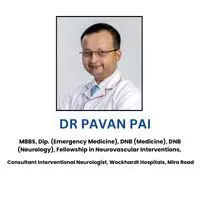Mumbai: As heavy monsoon showers lash Mumbai, Wockhardt Hospitals, Mira Road, has issued an urgent advisory about the growing risk of tapeworm infections, specifically neurocysticercosis, a potentially life-threatening brain infection caused by the larval form of the pork tapeworm (Taenia solium).
The hospital is urging the public to adopt strict hygiene and food safety measures to curb the threat during this vulnerable season.
Tapeworms are intestinal parasites that typically enter the human body through the consumption of contaminated food or water. In many cases, people become infected by ingesting microscopic tapeworm eggs present on poorly washed vegetables or undercooked pork.
Once inside the body, these eggs can hatch and the larvae may travel through the bloodstream. They can eventually form cysts in the brain, a condition known as neurocysticercosis.

Dr Pavan Pai, Consultant Interventional Neurologist at Wockhardt Hospitals, Mira Road, explains, "During the monsoon, people frequently neglect fundamental food hygiene, but undercooked pork and inadequately washed vegetables are common carriers of tapeworm larvae."
He added, "Once ingested, these parasites can migrate to the brain, developing into cysts that can trigger seizures, debilitating headaches, and even irreversible neurological harm."
With monsoon-related flooding and deteriorating sanitation across many areas of Mumbai, the risks are higher than usual. Children and individuals with compromised immune systems are particularly vulnerable to such infections.
Common symptoms of neurocysticercosis include persistent headaches, seizures, nausea, confusion, and in some cases, long-term cognitive impairment.
Wockhardt Hospitals emphasizes the importance of prevention and early detection. "Never disregard persistent headaches or seizures. Seeking medical attention without delay can be life-saving and prevent potentially devastating consequences," Dr Pai strongly advised.
The hospital recommends consuming only filtered or boiled water, thoroughly washing all fruits and vegetables before consumption, and ensuring that meat, especially pork, is properly cooked.
Timely diagnosis, typically through CT scans or MRI imaging, followed by antiparasitic medication and supportive treatment, can significantly reduce the risk of long-term damage.
In light of the seasonal spike in infections, this public health alert serves as a critical reminder to maintain vigilance in food and water hygiene throughout the monsoon.



